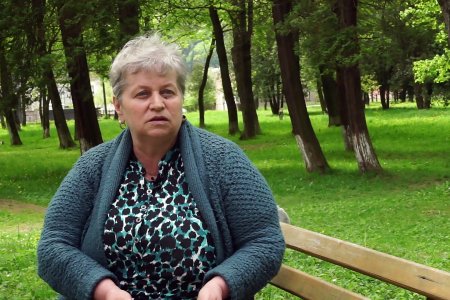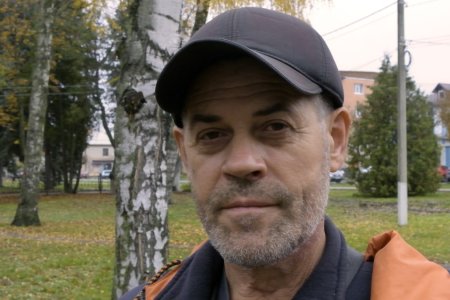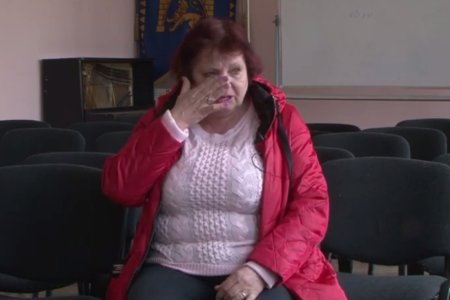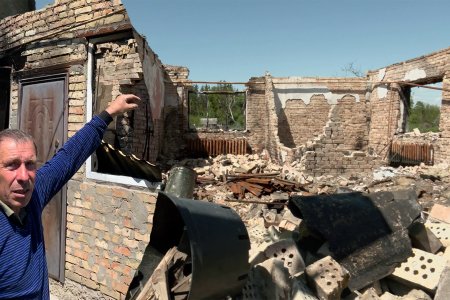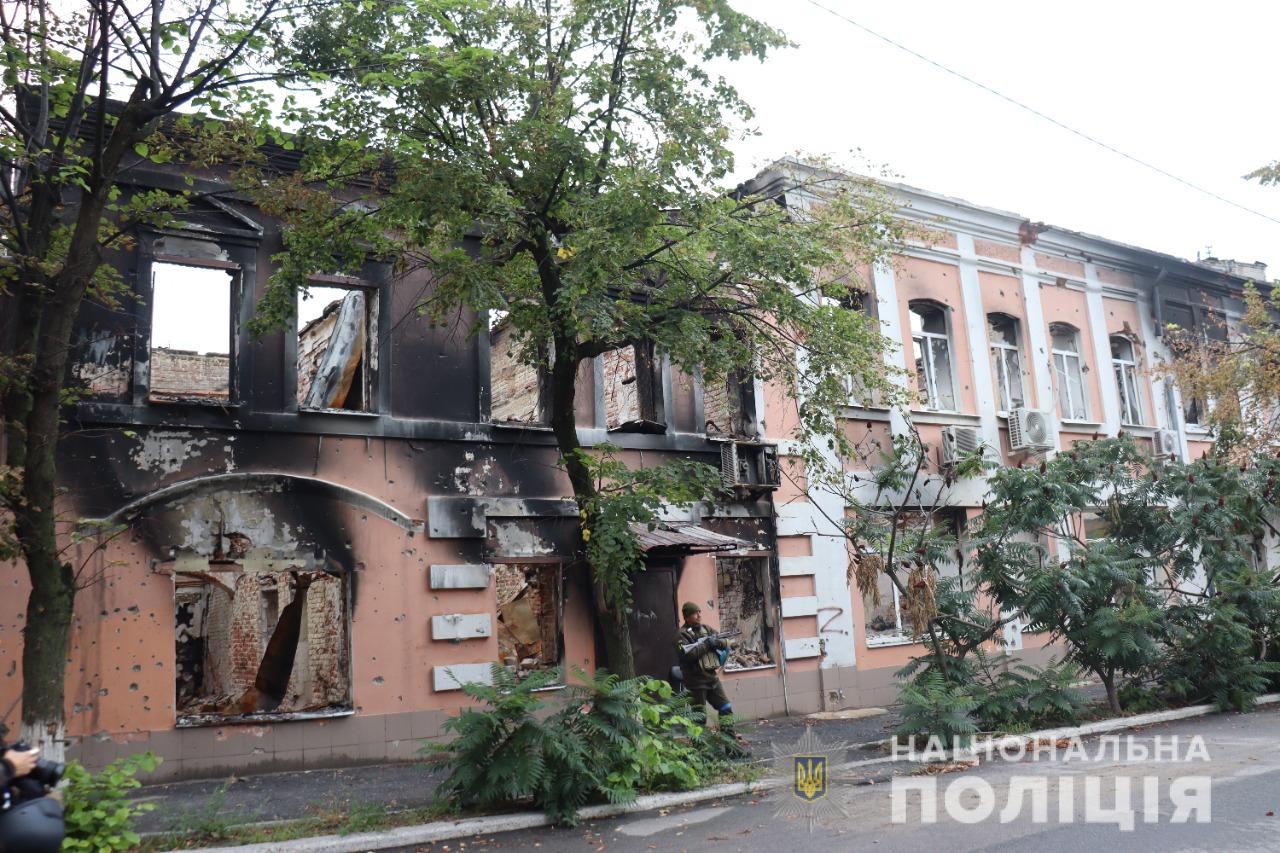
I am Olena from the city of Izium. I am a cynologist in charge of Ukraine's Izium center for sports and service dog breeding. Cynology is my life.
— What was the beginning of a full-scale war like for you?
— On 21 February, I went to Kharkiv on a business trip to train dogs for an exhibition. We were supposed to go to a show in Zaporizhzhia on 26-27 February. I came to the dog training ground where my girlfriend lives, and we practiced together. Later, her mother arrived, and we watched the news. It was the day before the war started, 23 February. The friend's mom said: “Oh, that’s it, that’s it, the war is starting.” We responded: “What war? It’s impossible.” My friend went to the night market, she worked there, and I stayed at home with her mother. Her mother woke me up: “Olena, get up, we are being bombed.” This was a shock. I have a mother, brother, child, and dogs in Izium. I knew I needed to get back. The subway was still working, so I drove to the bus station, got on a bus, and went home.
I came home and told my mother: “They bombed Kharkiv; it’s the war.” So, the same day, I moved with my child to the basement. We no longer had bomb shelters. There were some, but in such a state ... We went to an ordinary basement where we lived for two weeks.
There were air raids, and it was terrifying. It is the worst! The entire house shakes down to the basement when a fighter jet flies by. Everything crumbles; cement and plaster pieces are flying. It is horrible, and some animal fear arises inside.
You cover the child with your body and understand that it will not save him. It so happened that there were many people in the basement where we hid with my son. Some spent the night sitting on chairs. My mom, brother, and dogs stayed in our house: our next-door neighbors had a tiny basement. So when the shelling began, they would go there, and the child and I were in a different place with other people.
— Were there any problems with food in Izium?
— When I returned to Izium, the stores had almost empty shelves. In a panic, people started buying everything. Then, everyone brought something from home when people went to the basements. People were allowed to take what was left after the shops were bombed. It was a famine during the first month. Also, we immediately lost electricity, water, and gas. While the light was still working, you could cook something in a slow cooker. Later, we used fire to cook.
— Were any military installations in Izium that caused the Russians to launch missiles?
— Of course not. We didn't have any military base, nothing at all. There was one in Chuhuiv and military warehouses in Balakleya. There were no military installations in Izium at all. The only thing they needed was our motorway, which goes to Donetsk. They wanted the city as a hub to accommodate equipment and soldiers. So the town’s destruction was sheer barbarism and terror.
— Have you witnessed the destruction of civilian facilities?
— Of course, when they hit the city center. The next day I went to our military — we collected groceries and cigarettes. I saw the city center destroyed, the houses bombed, and the park ruined.
— Was your house damaged during the shelling?
— A Russian shell hit our nine-story building and damaged the two top floors. My neighbor’s brother died from wounds. My mother died during the occupation. We live in a small city, and many acquaintances died: some from the wreckage, some were shot. The car would come to houses, and they would shoot people if someone did not want to give something away.
— Was it possible to receive medical services during the occupation?
— Pharmacies and hospitals were bombed in the first days. Russians didn't care what they shot. They would immediately sew up their own, but they did not treat the locals. There were our doctors who went around and operated in the basements.
— How was your evacuation from Izium?
— We had no phone connection and no information regarding evacuation. Our town’s authorities, volunteers, military, and Teroborona [Territorial Defence Force] went to the basements with large crowds and said: “Take the children and board the buses.” There were no connections, so everything happened spontaneously. They would bring buses to the square and then rush around, gathering people. Finally, they ran to our basement and said there was an opportunity to evacuate. Of course, no one thought twice.
The evacuation took place between the bombings. The planes usually flew in twos. They dropped bombs and flew away for 40-60 minutes. During that time, while they were gone, volunteers with the military would come running and gather people.
We had to leave immediately because that was our chance. They came, I grabbed the child, and we ran together to the bus. It was 10 March. Just like that, we managed to escape, but my mother and brother (they were in a different place) were not found. If people were in a small basement or hiding in an apartment — it was impossible to discover them. It's the way things were, and I can't blame anyone. Also, we left with no trouble, but later it became challenging. They even shot one volunteer who took people away. My cousin went after us with the volunteer Evgeny. They walked from Izium to Krasnyy Shakhter, spent the night with the locals, then crossed the river on a boat. People with vehicles met them on the other side and drove them to Poltava. This volunteer guided my cousin and his wife. However, two days later, he went again to save more people, and the Russians shot him.
A month after we left and were already in Spain, my brother got through and said that they were alive. We have begun to think about how to pick them up from Izyum. Some drivers agreed to take away people for pay. Volunteers also hired drivers to take people out. I found a chatbot, “Help to leave”, where the volunteers agreed to help. They said they would hire a bus. By that time, my mother was already anorexic.
Of course, the Russians and the LPR-DPR [“Luhansk People’s Republic, “Donetsk People’s Republic”] did nothing for the locals. My mother was dying, but they did not care.
Volunteers hired a driver, but my mother couldn’t walk anymore. There was one cart for our entire building and many sick people. The collection point was far from our house, about three kilometers across the bridge. My brother found a car, took mom and the dogs, and they came to the meeting point. When the bus arrived, the driver said he would not take the dogs: “Put them wherever you want.” Brother, Thank God, arranged with a neighbor that he would look after the dogs until we could take them. People got into this bus and drove to the first checkpoint. We were searched and filtered from half past nine to half past four. After that, they ordered the bus to return to the collection point, the driver was arrested, and the others were sent back home. What happened to him, I don't know.
My brother and weakened mother were left in the middle of the street. Then, together with four orcs [Ukrainian name for the Russian army], they grabbed her by the arms and carried her home. Mom was afraid, and she cried, but nothing could be done. This attempt to leave failed.
We tried to find a way to get them out of there. Then I wrote to my brother: “Go to these katsaps [ethnic slur for Russians], let them at least send you to Russia, and there the volunteers will be able to pick you up.” He went with the mother in a wheelchair to the administration. There we had a collaborator Sokolov who agreed to be in charge. He said: “I can't help you. Go to the hospital and obtain a certificate.” It was evident that my mother was barely alive, but he jeered so much. They went to the hospital, and another collaborator met them. A pseudo-chief doctor told them: “I cannot give a certificate because it is anorexia, a psychiatrist needs to diagnose her, but I am a surgeon and have nothing to do with this.” He was perfectly aware of my mother’s condition…
I do not know whether it is possible to prosecute these people, but you can’t name them human because they killed my mother with their actions. If my brother could take her out in time, she would still be alive. Then, miraculously, a man from Antratsyt came down and took out my brother and mother. She was admitted to the hospital there, but they could not do anything.
I contacted all the volunteers, but they told me: “We could go to DPR, but not LNR because everything is miserable there.”
Mom hasn’t eaten for months, except that they dripped glucose. There she died and was buried. However, I managed to get my brother out of there. First, he got to Rostov, where volunteers hid him. They teamed up with our Ukrainian volunteers and helped people to escape from Russia to Europe. They bought tickets, hid people in apartments, and accompanied them along the way. From Rostov, he was sent to St. Petersburg, from there to Finland, and finally to Sweden. We saved him. Later, with the help of volunteers, I managed to take out the dogs. They were, of course, in a terrible state and looked like skeletons. It was hell, and it still doesn't end for me.
— Who helped the Ukrainians to leave for Europe from the territory of Russia?
— Russians helped them in cooperation with our volunteers. They don't advertise this much because it’s a risk for them. One person buys tickets and gives them to another; the next person does not know what the previous one did. This way, everyone does their own thing. One takes refugees home, and another walks them to the bus station. Then, at the airport is still another one. A fellow from St. Petersburg went to live in another country but left his property in Russia. However, when the war started, he came back to help people. When their mobilization began, he had to leave for good, but before, he stayed in this “beautiful” country and helped our people. He hid refugees in his home, bought food, and obtained tickets.
— Did the invaders commit repressions on the territory of Izium?
— The Russians had lists with addresses of people who were in Teroborone or served in local government. Because there was a constant rotation [of Russians], they snooped around these addresses many times and carried out searches. Communists from the Opposition Platform for Life — Fomichevsky, Shteiman, and others received lists of pro-Ukrainian citizens. They searched for them and terrorized relatives. We had a man who, back in 2014, was a driver in the ATO [Anti-Terrorist Operation], but not for long. The doctor told me that the LNR people came, took him away, and beat him badly. I don’t know what happened to him later.
— Could you forgive the Russians?
— Oh, it hurts so much, and right now, I can’t!
